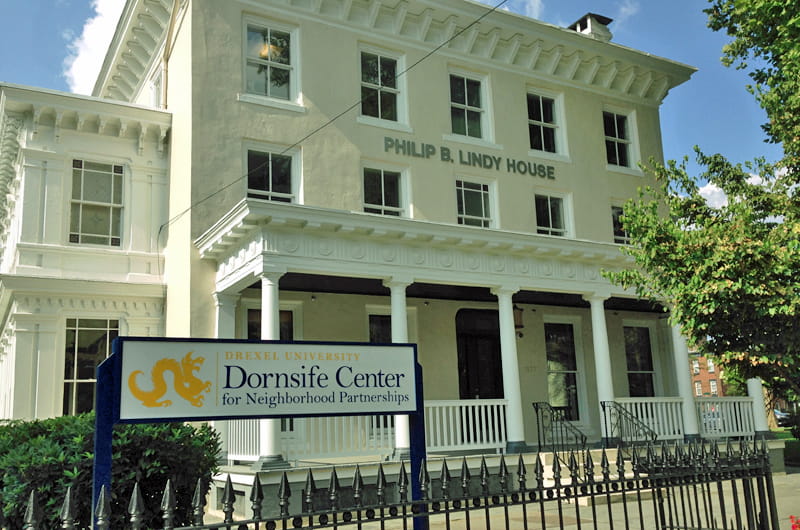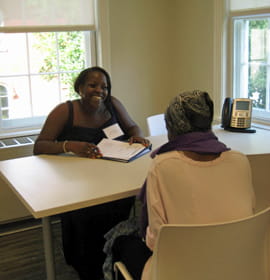Drexel Law School Launches Free Legal Clinic for Residents of West Philadelphia

This fall, Drexel University’s Thomas R. Kline School of Law launched a new Community Lawyering Clinic at Drexel’s Dana and David Dornsife Center for Neighborhood Partnerships, located at 35th and Spring Garden Streets. The clinic provides law students with the opportunity to gain firsthand experience working with real clients, while empowering and serving the neighboring Mantua and Powelton Village communities of West Philadelphia.
Under the direction of Rachel López, JD, an assistant professor in the Kline School of Law, the clinic will build students’ abilities as lawyers, leaders, advocates, policy analysts and community organizers through hands-on interaction with community members in need of legal services, referrals and other forms of advocacy.
The clinic offers referrals, legal advice and direct representation in matters involving family, consumer protection, property and other legal areas affecting the community as well as training, pro bono programs and workshops on community-wide legal issues. Through a legal needs assessment completed last spring, input from the community was collected regarding the most prominent legal issues, where community members go for legal advice and other challenges they face.
“In order to reach as many people as possible, the Community Lawyering Clinic provides a continuum of legal services that range from providing simple legal information, such as where to file complaint, to full scale representation,” said López. “To ensure that the clinic increases access to justice and doesn’t duplicate the efforts of other legal service providers, when there is another legal service provider that is in a better position to represent a client, we refer the client to them.”
Students in the clinic are also creating materials such as fact sheets about issues that have been identified as unmet legal needs to provide basic information about the law and relevant resources that community members can access.
Once a month, the clinic will provide community legal education on topics ranging from foreclosure prevention to employment discrimination. The first “Law Day” took place on Friday, Sept. 5 with an hour-long seminar on the common homeownership problem of tangled titles by expert attorney Miriam Jacobson, followed by two hours of client in-take sessions. After the training, law students met with over a dozen community residents who were in attendance to discuss their legal concerns.
The next Law Day will take place on Fri, Oct. 3 with a training session on consumer protection and bankruptcy by Mary Anne Lucey, executive director of the Consumer Bankruptcy Assistance Project from 2 – 3 p.m., followed by client in-take from 3 – 5 p.m.

“Our goal for the clinic is to provide holistic legal services. In order to do this, lawyers must always explore whether litigation is the best solution for the client,” said Lopez. “It also involves collaborating with a team of social workers, crediting and housing counselors, and/or healthcare providers to address the multidimensional issues of our clients. Viewing our clients in the limited context of their legal issue prevents lawyers from creating lasting change in their client’s lives. In the clinic, we strive to understand our client’s greater societal, community and familial context.”
The clinic will be staffed primarily by third-year students, who are certified legal interns and can appear in court. It is overseen by an advisory board made up of Drexel faculty and representatives from the community. The board guides the direction of the clinic and helps to get the word out about the available services.
The Dornsife Center, which opened in June, was designed to support the needs of the communities that surround Drexel. The urban extension center’s offerings combine Drexel expertise and community knowledge to solve problems in West Philadelphia.
“Every community needs legal support and advocacy, but we also know that there is a huge justice gap in low-income neighborhoods, and that certainly seems to be the case in Mantua,” said Jennifer Britton, associate director of the Lindy Institute for Urban Innovation and launch director for the Dornsife Center. “We’ve had a lot of interest in programs like know-your-rights training as well as sessions that deal with housing and infrastructure, with tangled title being a great example of a legal problem that touches a lot of community members and has a huge impact on the neighborhood.”
“I think that, as the clinic works with our neighboring communities to identify community-wide issues calling for legal support, we will find that there are problems and priorities that cross community boundaries,” said Britton. ”Drexel’s law school students and faculty will be able to work with residents in both Mantua and Powelton Village to design problem-solving and advocacy plans that give residents a chance to unite around common challenges.”
Students participate in the Community Lawyering Clinic on a year-long basis. During weekly seminars, students will develop legal skills and learn substantive law related to their current cases and projects. Students who participate in the clinic receive six credits per semester and spend an average of 16-20 hours a week on their casework.
While the first semester focuses on engagement in community outreach and providing direct legal services to individuals, during the second semester, students will design and implement projects aimed at addressing systemic challenges facing the community, such as improving access to justice, for instance, by developing know-your-rights trainings or policy advocacy on an obstacle that arose during their first semester’s work.
Rachel López, who joined the faculty in 2013 after three years at Seton Hall Law School, has supervised law students on a wide range of cases, including immigration, human rights, death penalty, prisoners’ rights, family law and civil rights cases, in both domestic and international forums. She also was a cooperating attorney with the Center for Constitutional Rights, where she worked on Freedom of Information Act litigation, a human rights report and a class action lawsuit challenging the NYPD’s unconstitutional stop and frisk practices.
Beyond the Community Lawyering Clinic, the Kline School of Law offers students additional opportunities for experiential learning through clinical programs including a Criminal Litigation Field Clinic in which students represent clients at hearings and trials; an Appellate Litigation Clinic that enables students to practice law before appellate courts; and an Entrepreneurial Law Clinic, which gives students opportunities to work with entrepreneurs in the Philadelphia area who need legal advice for getting their ventures off the ground. Additionally, co-operative education opportunities provide students with real-world learning experiences with more than 100 partners throughout Philadelphia’s legal community.